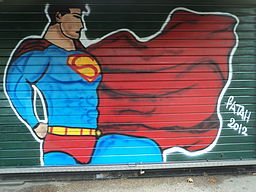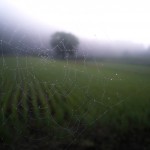I spend a lot of time around boys aged 3-7. My own son is 5 1/2. Among this demographic, I see a lot of superhero t-shirts, hoodies, backpacks, toys, capes, etc and hear a lot of superhero talk. In my house we go very light on branded items and superhero images. In some very important ways, even the Powerpuff Girls, a cartoon I’m a fan of myself and for my kids, falls into the superhero category.
When one of the other five year olds in my son’s weekly karate class asked why he couldn’t do the new move correctly right away, I noticed that he was wearing a superhero t-shirt. “How can we learn a move?” asked Sensei. Another little boy shouted out, “Practice!” Practice and perseverance is something that all kids learn over time, and it seems like about 5 years old is when the lessons begin to set in. Yet even adults never master this lesson, which admittedly is a lifetime’s work. Do super heroes and pop-culture, wand-waving magicians and witches diminish this lesson, by depicting people who don’t have a choice about their powers or don’t have to work at them?
In general, I think pretending to be a superhero is part of healthy imaginative development. Who doesn’t want to fly, save people, or fight the monsters? Small children discovering their own autonomy and becoming cognizant of their own powerlessness in the world need play and images that help them feel powerful.

Superheroes have been around for most of the 20th century. Knights existed before then. Now superheroes are far more mainstream than they were when I was a child. I was aware of them – and even watched the first few Superman movies with rapt attention! – but they just weren’t as ubiquitous as they are now.
I’m starting to wonder if the ubiquity of heroes that are innately born with exceptional powers (Superman, Powerpuff Girls) and/or exceptional privileges (Batman, Iron Man) might be problematic. I wonder how this parallels with Harry Potter and other magical literature. I wonder how these tropes are influencing our understanding – and my kids’ understanding – of magical practice.*
In the case of Superman we have a seemingly perfect man. He is born with his powers and is always Good and Just. He doesn’t need to work on his powers, he just has them. Batman is a far more morally grey character and his ‘powers’ aren’t physically innate, but, like Iron Man, the brains and finances that allow him to develop the technology to be a super hero are inherited. There is no hope for the 99%. We all need people to emulate, but in these stories I see a Jesus-like saviour and the 1% that swoop in save us. What happens when we get dependent on others to save us? The comic Kingdom Come addresses this very point: people are no longer trying to save themselves and each other; they’re waiting for the super heroes to come to the rescue.
In the fantasy world, Harry Potter fares a bit better. We get to watch magical children grow and develop their skills. What I find worrying is the split between the witch world and the muggle world. You are either born with magic or not.
Now, most Traditional Witches will say that some are either ‘witch born’ or not. I am agnostic on this point thus far. But I have experienced that some people are more natural ‘instruments’ or have an innate calling for certain paths. Like opera singing, this also applies to magic. But the idea that one is either blatantly magical or not just doesn’t hold up in my experience. Most people can develop whatever amount of skill they have, if for no other purpose than their own enjoyment. The world is not split along Magical or Mundane lines; why should people be dramatically different?
I choose to believe that witchcraft is both innate AND developed. This is what my experience, plus my understanding of the lore, tells me. What I fear is that people will take the above examples to an extreme: that one is born super or not super, or that greatness is something that is conferred upon a person – that I get saved externally, or made magical externally. I spoke ever so briefly about this last example in my recent post on being a student. I spent too many years waiting for the teacher that would bring out my greatness, when all along I had my own greatness to foster. I want my kids to know that anything worth learning takes practice (handwriting, reading, martial arts, magic).
Most people who delve into Paganism or magic(k) learn quickly that ‘powers’ come over time and with work. Even those that have demonstrable innate gifts (seeing spirits, trancing, psychic skills, etc) have to learn to control and hone their skills. Successful people in any field know that they have to put in their “10,000 hours” to achieve greatness.
I think all of us want to believe that there is something Different and Special about us as individuals, that we might be singled out by something beautiful (maybe by a vampire in Forks, WA?), that we might rise above the limits of our humanity. But it is the very limits of our humanity that stretch and expand as we dive into the practices and practice of the magical life. Each of us bring our own nuances of personality and talents to similar skills, like divination, possession, or casting a circle.
One of the theological points I feel most strongly about is “we save ourselves and each other.” We each of us are superheros at some point in our lives. We grab the lifeline that some one has thrown us and we dig deep into our courage and integrity, pulling ourselves out and up with our own strength. We combine our forces (or stockpiles) and find refuge from the zombies. I reach out to the gods and spirits, and they reach back. No one Great Being is going to swoop in and save our day. How can I teach my kids they can be the superhero of their own lives? By modeling the practice of my skills and reaching out to save myself and others.
We are each of us superheroes in the making.
*I am not an expert in the comics or books I am talking about. By all means, go into detail in the comments, but I hope the larger ideas here hold, even if my understanding of certain points is weak. There are also so many retconned storylines and subplots that I can’t keep up. I’m sure there’s some issue somewhere to disprove one of my notions, but on the whole I don’t think I’m misrepresenting any of the characters mentioned in this post.











